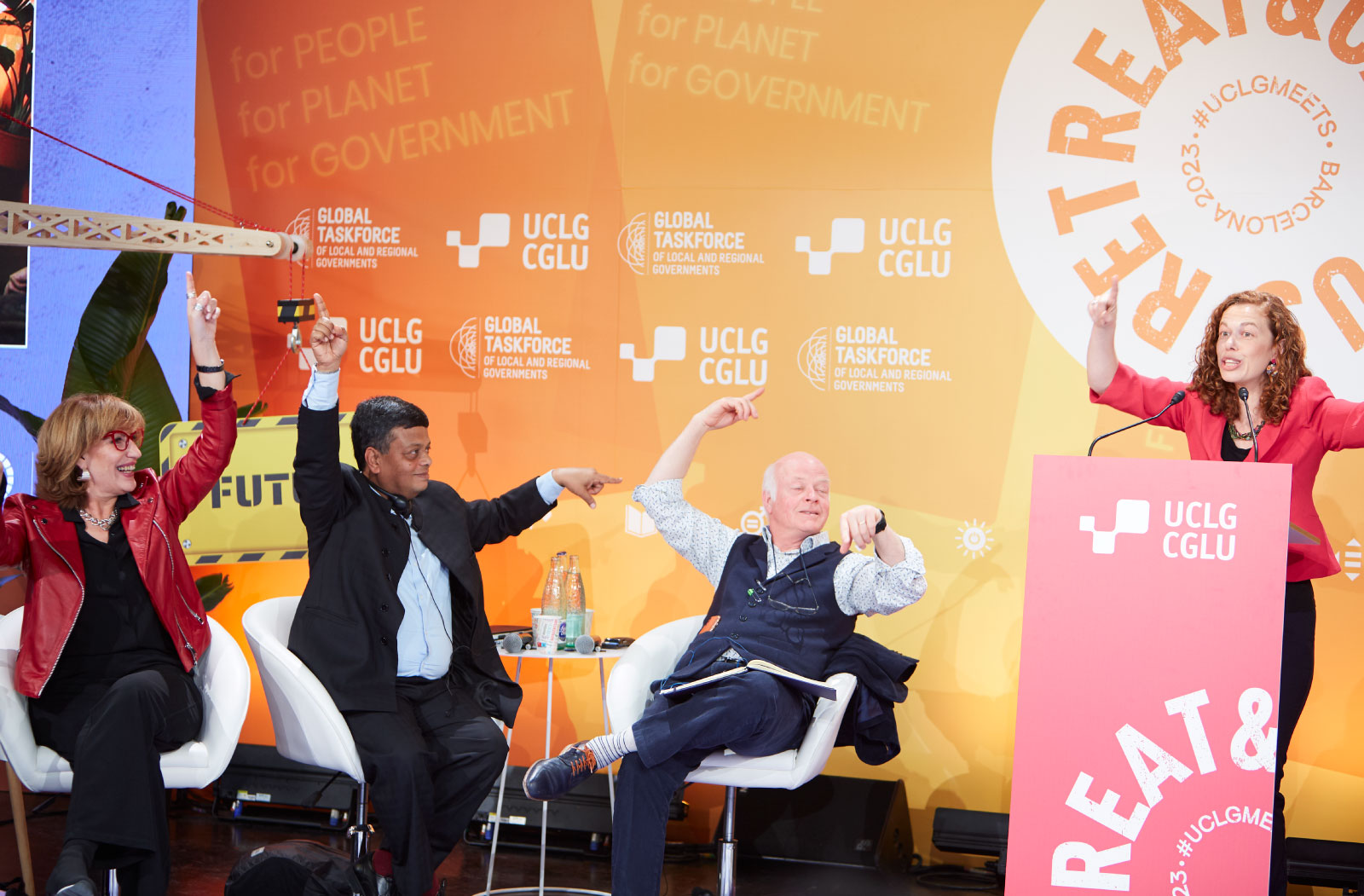The first two days of the UCLG Retreat were focused on “The Power of We” and the commitments around the Pact for the Future of Humanity. Four enablers for the Pact’s implementation were discussed: the commons, finance, trust, and governance architecture.
The concept of commons and the Care Revolution will shift what means to live together. It concentrates on questions such as: who provides local services or who are the caregivers? UCLG hopes that this kind of work will be maintained in public hands and proposed a shift of power, where the public can take up a more central position and diversity is celebrated. “However, there is also a boldness in recognising that we do not always know yet how to get there fully”, Emilia Saiz, UCLG Secretary-General, acknowledged. There must be priorities and transformative partnerships to facilitate implementation and turn the power of ME into the power of WE. Lorena Zarate, from the Global Platform for the Right to the City, emphasised that commons are at the core of life. Sustainability, human rights, democracy, air, water, land, forests, housing, education, safe public spaces, and others are key examples in this respect. While many cities have already advanced in the right direction by delegating the management of facilities of the commons to the public and community sector, UCLG can foster and set in motion a larger transformation.
Often, trust-building work is directly related to financing the work of local governments. More funds also mean expanded capacities of local governance, enabling municipal officers to work on topics such as resilience, human rights, and culture. While the tools to finance a more commonsoriented approach exist, which would allow financing the commons, implementation is often lacking. We need to convene experiences, create gender-equal economies, and modernise where necessary. Carlos de Freitas, FMDV – Global Fund for Cities Development co-director, stressed the lack of institutional space to discuss local finance and economy.
Another challenge facing local governments is a lack of trust, often exacerbated by “the powers in the shadow”. Ranging from corruption to private companies who do not want to pay taxes, the question here is how to work together and how to support smaller cities and communities in particular in rising to the challenge of building trust. Part of that work happens at the UCLG Retreat, where speakers called for boldness. “Discuss the ideas we do not agree on” was one of the recurring themes. “You cannot achieve the Pact by just talking to your friends” was another one. Katy Rubin, who works on homelessness in Greater Manchester, UK, practices a method called legislative theatre, where the community comes together around a local problem and shares stories. This turns into a play for a diverse target group, which leads to discussions and policy testing on stage. A shared understanding of the experience of living in the city for different people increases empathy, understanding, and trust.
The challenge for local governments to be listened to, especially during a humanitarian crisis, was much discussed. How can we make sure that local and regional governments can meet their functions and fulfil necessary services even in particularly challenging circumstances? Participants agreed that both local action and collective action, which is what UCLG focuses on as a network, are key. The Pact for the Future shows how it is possible to include everyone and pursue the future we deserve. While there will be some changes made to the Pact during the Retreat, it still serves as the uniting and guiding framework for UCLG.
In addition, local government practitioners need to focus on empathy and inclusion to turn suggestions and words into actions. Maria Fernanda Espinosa, former minister of Ecuador, raised the need for a shift in our value system. This will include closing the gap between government and power, fostering trust, and governing the commons. By avoiding governance in silos and forming Open Government Partnerships, it will be possible to implement the Pact based on a shared understanding the world as single ecosystem with shared power.
Participants agreed that the scope of UCLG’s work is well beyond the organisation. It means that we must convene and catalyse, causing other stakeholders to take action in order to achieve visions of the Pact, as William (Billy) Cobbett, former Director of the Cities Alliance put it. This means that UCLG must articulate very clearly what it stands for and put forward a positive vision of the Pact for the Future, which in turn will contribute to building trust and showcasing the Pact’s three pillars: People, Planet and Governance.
THE QUIZ
Aromar Revi, the founding Director of the Indian Institute for Human Settlements (IHHS) and UCLG Ubuntu Advisor, participated in the UCLG Retreat in the afternoon session on Tuesday, 21 February. He proposed three key transformations for fulfilling the revolution of care: solidarity, compassion, and sharing embedded in the UCLG Pact for the Future. The transformation of the nature of power, the nature of resources and money, and the mobilization of citizens were his reflections on how to elevate the role and relevance of the local and regional governments at the global level.
Revi asked the audience to participate in a quiz to exemplify the importance of understanding the complexity of transforming a 20th-century financing and governing model into a 21st-century one. The questions he posed are given below. We challenge you to do the quiz (answers will be given in tomorrow’s Municipal Times Journal).
1. What is the size of the global economy (in USD)?
2. What is the yearly added value of the global economy (in percentage)?
3. How much of that yearly added value is produced by local governments?
4. Where does that added value go?

